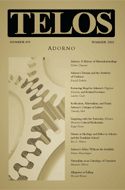Lauren Coyle’s “The Spiritless Rose in the Cross of the Present: Retracing Hegel in Adorno’s Negative Dialectics and Related Lectures” appears in Telos 155 (Summer 2011). Read the full version online at the TELOS Online website, or purchase a print copy of the issue here.
 In response to the general theoretical uncertainty concerning Adorno’s reception of Hegel, this article delineates and interrogates the “Hegelian” and “anti-Hegelian” aspects of Adorno’s Negative Dialectics in view of the recently published lectures. The first section of the article elaborates Adorno’s central points of adherence: (1) in the notion that there is no priority of the subject and that critical theory must return the “freedom to the object”; and (2) in the understanding that there are no “mere facts,” but only mediated appearances of immediacy that should be understood through the historical dialectical unfolding of “objective underlying trends” and “proximate triggers.” The second section outlines and critiques Adorno’s signal departures from Hegel: (1) in Hegel’s notion that determinate negation necessarily yields a positive affirmation, which opens out into to his notions that: (a) all history is progressive becoming despite present suffering and (b) absolute freedom consists in the Spirit’s recognizing itself as all reality, in the final reconciliation of subject and object in the full realization of the identity of subject-object identity and subject-object non-identity; (2) in Hegel’s alleged privileging of the universal over the particular despite the demands of his own dialectic of universal and particular; and (3) Hegel’s ostensibly uncritical use of the antinomy of totality and infinity, which Adorno argues is in fact reflective of a key bourgeois antinomy between the notion of freedom in “closed” political communities, on the one hand, and the “endless” need for the expansion of capitalist value, on the other. The article concludes by positing several points left unresolved in Adorno’s enlistment of Hegel, principally with regard to determinate negation, the dialectic of capital, and the immanent emergence of freedom in the wake of the mass atrocities of modernity.
In response to the general theoretical uncertainty concerning Adorno’s reception of Hegel, this article delineates and interrogates the “Hegelian” and “anti-Hegelian” aspects of Adorno’s Negative Dialectics in view of the recently published lectures. The first section of the article elaborates Adorno’s central points of adherence: (1) in the notion that there is no priority of the subject and that critical theory must return the “freedom to the object”; and (2) in the understanding that there are no “mere facts,” but only mediated appearances of immediacy that should be understood through the historical dialectical unfolding of “objective underlying trends” and “proximate triggers.” The second section outlines and critiques Adorno’s signal departures from Hegel: (1) in Hegel’s notion that determinate negation necessarily yields a positive affirmation, which opens out into to his notions that: (a) all history is progressive becoming despite present suffering and (b) absolute freedom consists in the Spirit’s recognizing itself as all reality, in the final reconciliation of subject and object in the full realization of the identity of subject-object identity and subject-object non-identity; (2) in Hegel’s alleged privileging of the universal over the particular despite the demands of his own dialectic of universal and particular; and (3) Hegel’s ostensibly uncritical use of the antinomy of totality and infinity, which Adorno argues is in fact reflective of a key bourgeois antinomy between the notion of freedom in “closed” political communities, on the one hand, and the “endless” need for the expansion of capitalist value, on the other. The article concludes by positing several points left unresolved in Adorno’s enlistment of Hegel, principally with regard to determinate negation, the dialectic of capital, and the immanent emergence of freedom in the wake of the mass atrocities of modernity.



